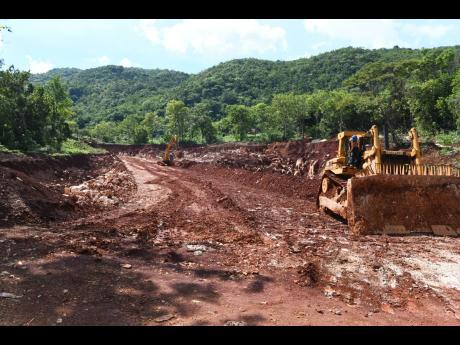Theresa Rodriguez-Moodie | Bauxite-alumina industry – an unequal sacrifice
The Mining Act of 1947 is the main Jamaican law governing compensation for disturbance of surface rights and damage to land or property as a result of bauxite mining and processing. The law does not cover health impacts or the effects of social disruption.
Compensation can also, however, be sought under the common law for claims of negligence, trespass and nuisance, or under the Charter of Rights and Freedoms for violation of the right to enjoy a healthy environment. To understand the way individuals are compensated by the bauxite-alumina companies, the Jamaica Environment Trust (JET) conducted a recent study titled Compensation within the Bauxite- Alumina Industry (2023).
JET’s 2023 study surveyed a total of 210 individuals from 17 communities where bauxite mining has occurred, is occurring, or are in proximity to bauxite/alumina plants. The survey revealed:
• 90 per cent do not know their rights to compensation under the Mining Act or other laws;
• 90 per cent do not know how to ensure fair compensation from the impacts of bauxite mining and processing;
• 93 per cent did not have the means to hire a lawyer to negotiate on their behalf;
• 91 per cent did not have the resources to go to court to seek fair compensation;
• Four per cent have sought independent legal advice on compensation;
• 98 per cent indicated that their community has been affected by dust pollution caused by bauxite mining;
• 64 per cent said that their community has been affected by water pollution;
• 34 per cent have experienced smell/odour caused by the mining operations;
• 64 per cent have sought medical attention because of the impacts of pollution on their health.
In communities close to alumina processing:
• 90 per cent lived in a community affected by dust nuisance caused by refining or bauxite waste;
• 37 per cent have experienced water pollution;
• 56 per cent have had to seek medical attention because of dust.
COMPENSATION RECEIVED
JET was not able to discover if compensation payments are reported to either the Jamaica Bauxite Institute (JBI) or National Environment and Planning Agency (NEPA), or if such records are kept. Nor was JET able to discover how communities/individuals are selected for compensation. JET’s study shows, however, that at least 50 per cent of community members surveyed have received some compensation for dust and/or water pollution caused by the mining and processing of bauxite.
Inequities in compensation - mining
Amounts vary significantly based on location and company. JET was unable to discover the basis on which they are calculated:
• Western St Ann: Compensation for dust pollution averaged J$8,500 per household every three months, and ‘rent’ payments varied between J$12,000 and J$30,000 per month, based on the proximity to an active mining pit. ‘Rent money’ is paid to those legal homeowners when active mining is occurring near (usually within 300 feet) of the house. There is no national standard or guideline which dictates the amount offered.
• Eastern St Ann: Households received as little as J$500 per room per month for dust pollution and J$50 per water tank per household.
• Manchester: Most households received a one-time payment, which ranged from J$6,500 per room up to J$222,000.
Inequities in compensation – processing
• Orangefield and Ewarton, St Catherine: Compensation ranged from J$500 per room per month, with some receiving up to J$35,000 per month.
• Hayes, Clarendon: Compensation from the dust effects from the alumina plant averaged J$2,000 per room per household, with some individuals receiving up to J$10,000.
• Nain, St Elizabeth: compensation varied from J$7,500 for a two-bedroom house while others received one-time payments of between J$10,000 and J$22,000. These payments ceased with the closure of the plant for upgrades in 2019.
FINDINGS
A few of the findings of the study are summarised below:
• The legislative framework does not address compensation adequately.
• There are no standard national or industry guidelines to cover compensation. There is wide variation in levels of compensation offered, including none at all.
• Compensation amounts agreed depend largely on an individual’s knowledge of the law, their ability to retain a lawyer and/or the company involved.
• Complainants often do not have the knowledge nor the financial means to access sound legal advice or valuations when trying to negotiate on their own behalf.
• Compensation amounts are entirely inadequate to deal with health impacts.
• Communities impacted by mining or processing do receive benefits in the form of water tanks, community centres, playing fields, greenhouses, scholarships or donations to local schools, but these are not a substitute for adequate monetary compensation to rural communities for their loss of livelihoods, quality of life and impacts to their health.
RECOMMENDATIONS AND CONCLUSION
• The Mining Act is in need of urgent revision to reflect current best practices, including definitions of monetary and non-monetary compensation.
• The Natural Resources Conservation Authority (NRCA) Act should be amended to include a provision for the use of environmental bonds as a source of compensation for damages and the procedures for claiming and use of such bonds.
• A new provision recognising the potential for dust nuisance should be inserted in the Mining Act to allow for those impacted by dust to have legal recourse.
• A compensation tribunal/commission should be established to deal with compensation claims.
• The Government of Jamaica should provide ongoing education to communities on their rights to compensation.
There is an inherent power imbalance between the companies and the communities, and this plays out in the inequities seen. The Jamaican State needs to redress this imbalance and the injustice it fosters. The full study is available on JET’s website.
Theresa Rodriguez-Moodie, PhD, is an environmental scientist and the CEO of the Jamaica Environment Trust. Send feedback to jamaicaenvironmenttrust@gmail.com.


